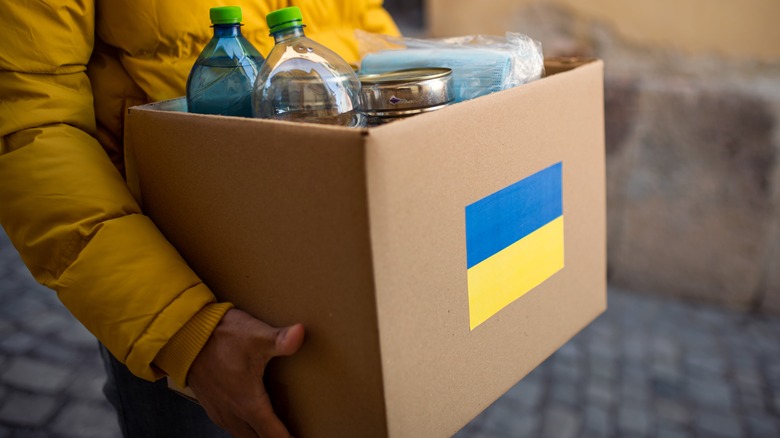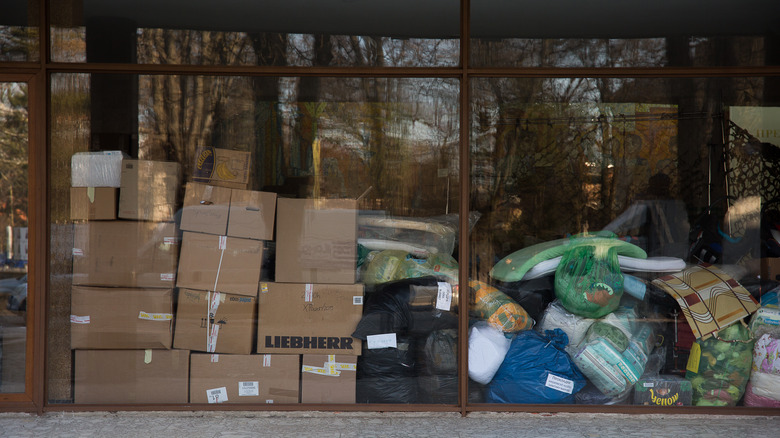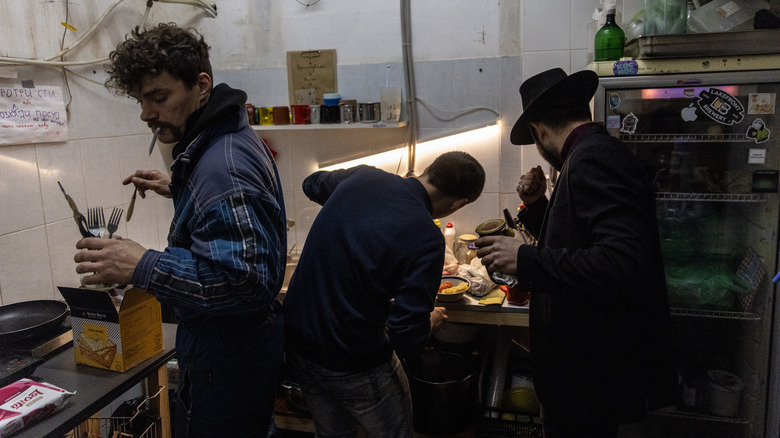Aid Agency Reveals The Truth About Food Scarcity In Ukraine
For nearly a month, Ukraine has been under attack from Russia, and while the smaller country has put up a strong resistance, humanitarian conditions within Ukrainian cities are deteriorating.
Representatives from Mercy Corps in Ukraine told CNN that many cities and towns within the country have only three to four days of food stored, when the ideal situation — even in a war zone — is to have close to a month's worth of food stockpiled. At this point the organization says that nearly 70% of the populations of Kharkiv and Sumy (two Ukrainian cities seeing some of the most fighting) are dependent on humanitarian aid, and getting it to them is not easy.
"The reality is that right now the humanitarian system is entirely broken down," Mercy Corps' advisor for Ukraine, Steve Gordon, said, noting that international organizations have not been able to get aid everywhere it is needed and many people are relying on smaller, local groups for assistance.
Getting deliveries into the cities is difficult
While many groups have focused on getting aid to refugees fleeing Ukraine, the task of getting supplies to those remaining in the country has been more challenging. Aid workers from the United Nations' World Food Programme (WFP) and delivery drivers from private companies like MHP (the largest food company still in the country, according to Forbes) are risking their lives to get supplies into the embattled areas where they are given directly to civilians or volunteers at restaurants and bakeries acting as distributions centers.
Forbes reported that MHP has been giving away nearly 330 tons of chicken every day to feed Ukrainian citizens, and that the company is doing everything in its power to keep its farms located in the country operational. While many of MHP's deliveries have become humanitarian donations, the company is still selling food to grocery stores and distributors, though MHP chair John Rich said the proportion of its work that becomes humanitarian increases daily as the number of functional stores continues to decrease. France 24 reported that supermarkets have become deliberate targets of Russian bombings in recent days, in an apparent effort to cut off already low food supplies to civilians.
Additionally, representatives from the WFP told The Guardian that getting the food to the right places is difficult because humanitarian corridors have not been reliably established, and truck drivers are concerned about entering the cities where aid is needed for fear of violence or of being conscripted.
Blockades are complicating matters
While getting supplies to Kyiv and Kharkiv has been challenging for aid workers, it is still possible, unlike the situation in port city Mariupol, which has been entirely surrounded by Russian troops for over a week (via Wall Street Journal).
According to the International Committee of the Red Cross, the city is completely without water, gas, and electricity and has been undergoing regular shelling by Russian forces, including an attack on a maternity and children's hospital. Ukraine has accused Russian forces of blocking humanitarian aid from getting into the city, leading to reports of civilians fighting each other over whatever food there is left to be found. While a humanitarian corridor out of the city has allowed some civilians to escape, the WFP told The Guardian they have been mostly unable to get supplies in.
Ukraine denied a Russian offer of a ceasefire on Monday in exchange for the city's surrender, and Tuesday, Reuters reported, that Greek Foreign Minister Nikos Dendias declared his intention to collaborate with the Red Cross and personally lead a humanitarian mission into the city, which is home to a high number of ethnic Greeks. It is unclear if this plan will be successful.
An increase in world food shortages are feared if the fighting continues
While the humanitarian crisis within Ukraine continues, experts are concerned that the war-related food shortages could worsen around the world.
According to France 24, Ukraine and Russia account for approximately 30% of the world's wheat exports, 80% of the world's sunflower oil exports, and a large amount of maize and other grains. With Ukrainian farmers potentially unable to harvest, or otherwise redirecting their crops to their own country as Forbes reports MHP plans to do, and Russian exports hamstrung by global sanctions, already high food prices could see a dramatic increase in the coming year.
In addition to creating shortages and high prices in countries dependent on the exports, the WFP issued a report explaining how the situation could create further humanitarian complications. Prior to the war, Ukraine was one of the WFP's largest suppliers of grains, shares The Guardian. The agency used these donations in part to support humanitarian operations in countries like Afghanistan, Yemen, and Syria. Without that grain, and with the organization now needing to provide support to one of its top suppliers, the UN has had to reduce food aid to some countries, adding to global hunger and food insecurity in already precarious regions.
While the outcome of the war in Ukraine is still uncertain, one thing is clear, the longer the conflict stretches on the worse the humanitarian crisis will become inside the country and around the world.



